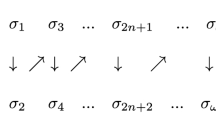Abstract
Kit Fine has argued that the Tarski Semantics for the language of first order logic (FOL) is inadequate. A semantic theory for FOL is inadequate if there are formulae of FOL whose meanings or satisfaction conditions it cannot compositionally account for. It is argued here that Fine’s case against Tarski rests on a mistake.
Similar content being viewed by others
Notes
Fine, Kit, The Role of Variables, Journal of Philosophy (2003), reprinted in the Philosopher’s Annual 2003. Fine Kit, Semantic Relationism, Wiley-Blackwell, 2007.
Fine (2003) (p. 1 of the version of his 2003 posted on his website).
My insertion.
Fine (2003) p. 4.
The emphases here are mine.
Here is roughly what Fine is thinking. The English term “dog” cannot be divorced from its spelling “d” “o” “g”. For Fine, the reason is that its spelling is one of its notational features. That is, its spelling is a fact about the term itself. So, its spelling has no effect on its meaning. Mutatis Mutandis, the same goes for the Spanish term “perro” and its spelling “p” “e” “r” “r” “o”. Thus, though spelled differently, the terms can be perfectly synonymous. For Fine, “x” relates to its logical content in more or less the same way “dog” relates to its spelling. For “x” has the logical content it does simply because it is the variable that it is. Thus, a logical content difference need not mean a semantic difference.
Fine (2003), p. 14.
Fine (2003), p. 14.
The SR semantics is unable to account for our compositional understanding of belief reports either. Fine posits Millianism. So, A and B are intrinsically semantically the same.
-
A.
Hesperus is a planet.
-
B.
Phosphorus is a planet.
They are intrinsically semantically the same in that they express the same singular proposition. But, clearly, C and D have different truth conditional contents.
-
C.
John believes that Hesperus is a planet.
-
D.
John believes that Phosphorus is a planet.
Here is Fine.
Consider, for example, the two belief reports, ‘John believes that Hesperus is a planet’ and ‘John believes that Phosphorus is a planet’. Then a worry for relationist and referentialist alike is that the component clauses ‘Hesperus is a planet’ and ‘Phosphorus is a planet’ will express the very same proposition, viz. a singular proposition to the effect that a certain object is a planet. But from this it would appear to follow that the belief reports must have the same truth-value - which clearly need not be so. How is the relationist to respond?
(Fine (2010) is responding here to criticisms from Soames (2010). (Soames Scott, Coordination Problems, Philosophy and Phenomenological Research, 2010) (Fine, Kit, Comments on Scott Soames’ “Coordination Problems”, Philosophy and Phenomenological Research, 2010).
According to Fine, the only semantic difference between A and B is relational. But, Soames (2010) points out that that difference makes no difference when compositionally calculating truth conditions for belief reports where A and B are component clauses. Given (SB), if A and B encode the same proposition or have the same intrinsic semantic value, then C and D have the same truth conditional content.
(SB) If sentence S expresses the proposition p, then the belief report “John believes that S” is true iff John believes p.
There is no way to avoid this result. We could try rejecting (SB). But then, we need an alternative to (SB). Here is Fine.
Soames might reasonably complain that the possibility of having a compositional semantics for belief reports will depend upon adopting something like (SB). For under a compositional semantics, the meaning of a belief report such as ‘John believes that S’ will depend upon the meaning of its parts - say, ‘John’, ‘believes that’, and ‘S’. But under the relationist semantics, there is nothing for the meaning of ‘S’ to be other than the proposition that it expresses. So it follows that, if S and S’ express the same proposition, then ‘John believes that S’ and ‘John believes that S’’ will have the same meaning and will therefore have the same truth-value… It might be thought that this complaint must somehow be misguided. For did I not provide truth-conditions for belief reports and, in so doing, did I not thereby provide a compositional semantics? The answer is ‘no’… So despite appearances, we do not have an adequate semantics, or even a fully adequate account of the truth-conditions, for belief reports. (SB) must therefore be allowed to stand and will give rise to the difficulties that Soames enumerates. The obvious response to these difficulties is to provide a compositional semantics for belief reports within the relational framework. But this is not something I do or know how to do.
The problem with SR, ultimately, is that it crucially relies on denying any intrinsic semantic difference between “Hesperus” and “Phosphorus”. If we do not posit an intrinsic semantic difference between the names, we must say that A and B have the same truth condition. So then, we must that C and D have the same true condition. Similarly, if we are forced to say that “x” and “y” do not intrinsically semantically differ, we must say that 1 and 2 do not intrinsically semantically differ.
-
A.
References
Fine, K. (2003). The role of variables, Journal of Philosophy.
Fine, K. (2007). Semantic Relationism. Oxford: Blackwell.
Fine, K. (2010). Comments of Scott Soames’ “Coordination Problems”, Philosophy and Phenomenological Research.
Hodges, W. (2001). Tarski’s Truth Definitions, Stanford Encyclopedia of Philosophy.
Soames, S. (2010). Coordination problems, Philosophy and Phenomenological Research.
Tarski, A. (1944). The semantic conception of truth. Philosophy and Phenomenological Research, 4(3), 341–376.
Acknowledgments
I thank Nathan Salmon and Tony Roy for discussion.
Author information
Authors and Affiliations
Corresponding author
Rights and permissions
About this article
Cite this article
Kwon, D. A defense of Tarski. Philos Stud 174, 1885–1894 (2017). https://doi.org/10.1007/s11098-016-0773-5
Published:
Issue Date:
DOI: https://doi.org/10.1007/s11098-016-0773-5




